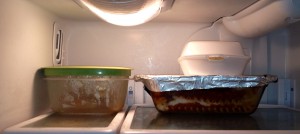 There is a time limit on leftovers.
There is a time limit on leftovers.
While leftovers can be a lifesaver for figuring out lunch the next day or dinner when you’re in a time crunch, it is important to remember safe food handling practices including eating, freezing or tossing out refrigerated leftovers within 3-4 days.
Limits to leftovers
Put leftovers in the refrigerator as soon as possible; make sure your refrigerator temperature is 40o F or colder. When possible, label your leftovers with a date and eat within 4 days. If you want to enjoy your leftovers longer than 4 days, transfer them to the freezer. TIP: When placing hot foods directly in the refrigerator, separate the food into small, shallow containers. This allows the food to cool more quickly.
Storage for Leftover Foods – Best Quality
| Product | Refrigerator (40o F) | Freezer (0o F) |
| Eggs: | ||
| Casserole, quiche, omelet | 3-4 days | 2 months |
| Hard-cooked | 1 weeks | Do not freeze |
| Soups & Stews: | ||
| Vegetables | 3-4 days | 2-3 months |
| Meat added | 1-2 days | 2-3 months |
| Meat Leftovers: | ||
| Cooked meat & meat dishes | 3-4 days | 2-3 months |
| Gravy & meat broth | 1-2 days | 2-3 months |
| Cooked Poultry | ||
| Fried Chicken, plain pieces, cooked poultry dishes | 3-4 days | 4 months |
| Pieces, with broth/gravy | 1-2 days | 6 months |
| Chicken nuggets, patties | 1-2 days | 1-3 months |
| Cooked Seafood: | ||
| Fish | 3-4 days | 3 months |
| Crab | 1-2 days | 3 months |
| Shrimp | 3-4 days | 2 months |
Fight Bacteria
Follow these four safe food handling practices to keep your foods safe from bacteria:
- Clean: Wash surfaces and hands before and after handling food products.
- Separate: Keep foods separate and don’t cross-contaminate.
- Cook: Cook and reheat food to at least 165o F (gravy, soups, and sauces should be reheated to a boil). Measure temperatures with a food thermometer.
- Chill: Bacteria grow quickly between 41o F and 140o F. Keep your food out of the danger zone by refrigerating it promptly.
For additional food safety information, contact your local UF/IFAS Extension Faculty member in your area.
Sources:
Partnership for Food Safety Education. www.fightbac.org
USDA Food Safety and Inspection Service. August 2013. Basics for Handling Food Safely. http://www.fsis.usda.gov/wps/portal/fsis/topics/food-safety-education/get-answers/food-safety-fact-sheets/safe-food-handling/basics-for-handling-food-safely/
- Summertime Safety ~ A Hidden Danger - May 18, 2015
- Spring into Action: Time to Get Moving - April 14, 2015
- America Saves Week ~ Online Challenge - January 27, 2015
